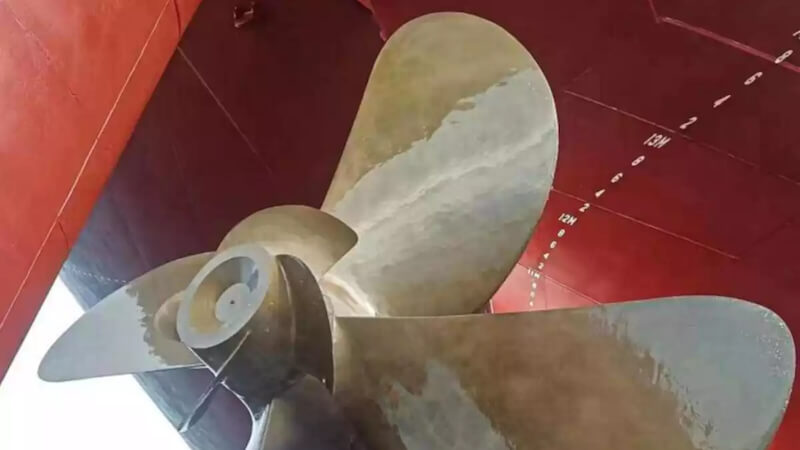
Chinese researchers have developed a coating for a ship’s propeller that resembles dolphin skin. It is intended to reduce fuel consumption by two percent and reduce CO2 emissions.
Whether on the road, in the air or on the water: the way we move is constantly changing. This was also demonstrated recently a development from China. Scientists at the Ningbo Institute of Materials Technology & Engineering (NIMTE) of the Chinese Academy of Sciences (CAS) developed an innovative coating for ship propellers. It is based on the properties of dolphin skin.
This so-called “dolphin skin” is intended to reduce the fuel consumption of large ships by around two percent. Shipping is responsible for around three percent of global CO2 emissions. The new technology could thus make a contribution to reducing these emissions. By using the dolphin skin coating, shipping companies can not only reduce their CO2 emissions, but also save fuel costs.
Ship’s propeller made from dolphin skin reduces fuel consumption by 300 tons
The researchers have already successfully tested the dolphin skin coating on a 300,000-ton crude oil tanker. He commuted between China and the Middle East. This coating allows the tanker to save around 300 tons of heavy oil per year. This reduces the ship’s CO₂ emissions by 900 tons. As a result, the reduced fuel consumption creates potential annual savings of around $140,000.
The coating itself costs around US$20,000 per propeller, which also makes the technology attractive from an economic perspective. The artificial dolphin skin is structured similarly to the skin of dolphins. It consists of microstructures that create minimal turbulence and thereby reduce the friction between the water and the ship’s propeller. These microstructures are only 0.1 to 0.2 millimeters in size and are made of a flexible material.
The sector could become significantly more environmentally friendly in the medium term
The coating allows ships to glide through the water with almost no resistance, which reduces fuel consumption. The development thus shows how bionic approaches and technologies could contribute to improving efficiency.
Reducing fuel consumption and CO₂ emissions is not only environmentally friendly, but also offers significant cost advantages for shipping companies. As the technology continues to develop and be more widely applied, shipping could take a significant step towards sustainability and efficiency.
Also interesting:
- Hydrogen ship is to transport containers on the Rhine
- Wind-powered ocean-going ship saves tons of fuel
- Callboats: Autonomous water taxis are set to revolutionize shipping in Finland
- This is the largest electric container ship in the world
The article Ship propeller with “dolphin skin” should save fuel and reduce emissions by Felix Baumann appeared first on BASIC thinking. Follow us too Facebook, Twitter and Instagram.
As a Tech Industry expert, I am excited about the potential of using “dolphin skin” technology on ship propellers to save fuel and reduce emissions. This innovative approach, inspired by the hydrodynamic properties of dolphin skin, has the potential to significantly improve the efficiency of ships and contribute to a more sustainable maritime industry.
By reducing friction and drag on the propeller, “dolphin skin” technology can help ships move through water more smoothly and efficiently, ultimately leading to fuel savings and lower emissions. This is a promising development in the ongoing efforts to make the shipping industry more environmentally friendly and reduce its impact on the planet.
I believe that investing in research and development of technologies like “dolphin skin” for ship propellers is crucial for the future of the maritime industry. By embracing innovation and leveraging nature-inspired solutions, we can work towards a more sustainable and efficient shipping sector that benefits both the industry and the environment.
Credits